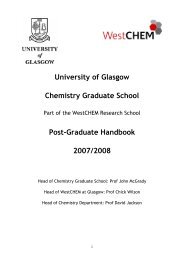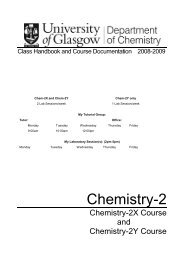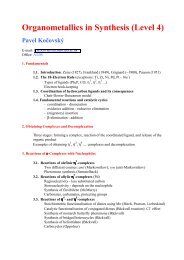Chemistry Study [PDF] - University of Glasgow
Chemistry Study [PDF] - University of Glasgow
Chemistry Study [PDF] - University of Glasgow
You also want an ePaper? Increase the reach of your titles
YUMPU automatically turns print PDFs into web optimized ePapers that Google loves.
<strong>Chemistry</strong><br />
Undergraduate study 2010
‘My course has amazing teaching, fantastic<br />
facilities and the experience is one I am never going<br />
to forget.’<br />
Julia Kennedy, Chemical Physics<br />
Faculties <strong>of</strong> Science<br />
<strong>Chemistry</strong><br />
Introduction<br />
There are many reasons for choosing our successful department<br />
as your place <strong>of</strong> study, including our standards in teaching and<br />
research, and our flexible Honours programmes.<br />
• Our department is part <strong>of</strong> the Scottish research pooling initiative,<br />
ScotCHEM. This is a major collaborative venture for the sharing<br />
and enhancement <strong>of</strong> resources for chemistry research in Scotland.<br />
Our strong research base has a direct impact on our teaching.<br />
• We help you to achieve success after you have graduated by<br />
<strong>of</strong>fering employability and pr<strong>of</strong>essional development training<br />
to all our students. Many <strong>of</strong> our students also obtain summer<br />
placements in industry between third and fourth years.<br />
Our undergraduate degree programmes are varied and flexible.<br />
Admission is initially into the Faculties <strong>of</strong> Science. This system allows<br />
you to explore a range <strong>of</strong> subjects in addition to chemistry itself<br />
before specialisation – a great way <strong>of</strong> broadening your scientific<br />
horizons.<br />
Faster Route programmes<br />
These might be <strong>of</strong> interest to you if<br />
you: are highly qualified at A-level or<br />
Advanced Higher level in relevant subjects;<br />
are motivated and keen to pursue an<br />
Engineering/Science degree with maximum<br />
concentration on the subject; wish to<br />
complete your degree faster than the normal<br />
time frame.<br />
For further information about entry<br />
requirements visit www.glasgow.ac.uk/<br />
undergraduate/degrees/entryrequirements<br />
Our department is part <strong>of</strong> the Scottish research pooling<br />
initiative, ScotCHEM. This is a major collaborative venture<br />
for the sharing and enhancement <strong>of</strong> resources for<br />
chemistry research in Scotland.<br />
<strong>Chemistry</strong> is a science with a welldeveloped<br />
theory base, which is central<br />
to modern life and which continues to<br />
make advances in, for example, new<br />
materials, antibiotics, semiconductors<br />
and trace analysis. It is the science <strong>of</strong><br />
molecules and materials:<br />
• how to make them<br />
• how they react and interact<br />
• how to detect, separate and identify<br />
them<br />
• how to find their structures and<br />
shapes.<br />
Come and visit us<br />
Open Day<br />
www.glasgow.ac.uk/openday<br />
In June and September we hold an Open Day to<br />
allow you, your family and teachers to visit us on<br />
campus and see a little <strong>of</strong> the city.<br />
Open Day allows you to speak to staff in<br />
academic departments, find out more about<br />
courses, tour the facilities, visit student<br />
accommodation and see for yourself what life<br />
would be like as a student at <strong>Glasgow</strong>. If you<br />
have a long way to travel you can also stay in<br />
one <strong>of</strong> our student residences.<br />
Alternative visiting arrangements<br />
Open Day is the best way for you to get a<br />
comprehensive picture <strong>of</strong> what being a student<br />
here would be like. However, if for any reason<br />
you can’t make it on that date, then we will be<br />
able to make alternative arrangements.<br />
To find out more visit:<br />
www.glasgow.ac.uk/afternoonvisits<br />
Applicants’ Visit Day<br />
At <strong>Glasgow</strong> we go the extra mile. If you receive<br />
an <strong>of</strong>fer <strong>of</strong> a place at <strong>Glasgow</strong>, we will invite you<br />
to visit us before making your final<br />
decision. Applicants’ Visit Day usually takes<br />
place in March. Details will be sent to you<br />
together with your <strong>of</strong>fer <strong>of</strong> a place.
We <strong>of</strong>fer employability and pr<strong>of</strong>essional<br />
development training to all our students in<br />
years one and two <strong>of</strong> their degrees.<br />
<strong>Chemistry</strong><br />
Degree: BSc, MSci<br />
Typical <strong>of</strong>fer<br />
Highers BBBB, preferably with two<br />
science subjects<br />
A-levels BBB, preferably with two<br />
science subjects<br />
IB 30 points including three science<br />
subjects<br />
For entry requirements visit www.glasgow.ac.uk/<br />
undergraduate/degrees/entryrequirements<br />
Many <strong>of</strong> our degrees have common first and<br />
second year chemistry courses. You make your<br />
choice <strong>of</strong> degree at the end <strong>of</strong> your second year.<br />
It is also possible for you to study for a Joint<br />
Honours degree, combining one <strong>of</strong> the chemistry<br />
options with another subject.<br />
What can I expect in first year?<br />
In your first year you will study <strong>Chemistry</strong> 1<br />
with two other subjects. <strong>Chemistry</strong> 1 involves<br />
lectures and problem sessions or tutorials in a<br />
one-hour period each day, together with a threehour<br />
laboratory each week. The topics covered<br />
include:<br />
• The periodic table and main group chemistry<br />
• Transition metal chemistry<br />
• Organic chemistry<br />
• Chemical kinetics<br />
• Theoretical chemistry<br />
• Chemical energy changes<br />
• Aqueous equilibria and pH<br />
• Macromolecules.<br />
What can I expect in second year?<br />
In second year half your time will be spent<br />
studying chemistry and half is spend studying<br />
another subject. The chemistry at Level-2<br />
builds on the first year course and involves the<br />
following topics:<br />
• Molecular thermodynamics<br />
• Organic stereochemistry<br />
• Quantum mechanics, chemical bonding and<br />
symmetry<br />
• Organometallic chemistry<br />
• Main group chemistry<br />
• Enols and enolates<br />
• Spectroscopy<br />
• Kinetics<br />
• Aromatic chemistry<br />
• Coordination chemistry<br />
• Organic synthesis<br />
• Biophysical chemistry<br />
• Applied organic chemistry.<br />
You will attend two three-hour laboratory<br />
sessions per week. These reinforce and<br />
extend the material in lectures and allow<br />
you to develop practical skills. Small-group<br />
tutorials are also held every two weeks with<br />
a member <strong>of</strong> staff. Finally, we have two<br />
interactive teaching units that concentrate on<br />
ethical, environmental and financial issues in<br />
chemistry. These are designed to help you<br />
develop team working and presentation skills.<br />
What happens next?<br />
If you successfully complete the courses in<br />
first and second years, you may progress to<br />
Honours. At the end <strong>of</strong> second year you decide<br />
what degree programme to follow for your third<br />
and fourth years and, in the case <strong>of</strong> the MSci<br />
programmes, for fifth year as well. The MSci<br />
degree is ideal if you intend to pursue a career<br />
as a pr<strong>of</strong>essional chemist. If you do not wish<br />
to study to Honours level, there is provision<br />
for graduating at the end <strong>of</strong> Level-3 with a<br />
designated degree.<br />
Each degree programme has a set <strong>of</strong> core<br />
courses that all students must take. In addition,<br />
you select a number <strong>of</strong> optional courses from<br />
topics at the frontiers <strong>of</strong> chemistry. These<br />
optional courses are subject to revision and will<br />
change as chemical research topics develop<br />
within the highly research active department.<br />
In third year, our laboratory classes help you<br />
gain the skills in modern chemistry techniques.<br />
The chemistry courses contain a roughly equal<br />
mix <strong>of</strong> organic, inorganic and physical chemistry,<br />
although you specialise in the optional courses.<br />
The topics covered in the chemistry degree<br />
programme at Level-3 include:<br />
• Mechanistic organic chemistry<br />
• Organic synthesis<br />
• Controlling stereochemistry<br />
• Sugars and steroids<br />
• Reactive intermediates<br />
• Main group chemistry<br />
• Coordination chemistry<br />
• Heterogeneous catalysis<br />
• Organometallic chemistry<br />
• Solid state chemistry<br />
• Bio-inorganic chemistry<br />
• Biomolecular interactions<br />
• Quantum mechanics and symmetry<br />
• Kinetics<br />
• Spectroscopy<br />
• Diffraction<br />
• Photochemistry.<br />
In your fourth year, you will do an extensive<br />
research project in our well-equipped research<br />
laboratories. You will also study a mix <strong>of</strong> core<br />
chemistry courses and options.<br />
Core courses include:<br />
• Organic spectroscopy<br />
• Advanced organic synthesis<br />
• Heterocyclic systems<br />
• Colloids and macromolecules<br />
• Statistical thermodynamics<br />
• Metals in medicine<br />
• Inorganic mechanisms<br />
• Homogeneous catalysis.<br />
Optional courses for chemistry currently include:<br />
• Pericyclic reactions<br />
• Polymers in organic chemistry<br />
• Vibrational spectroscopy<br />
• Metal oxides as advanced materials<br />
• Biomolecular separations<br />
• Electrochemistry.<br />
It is possible to do an MSci in this subject<br />
involving a total <strong>of</strong> five years. The MSci degree<br />
<strong>of</strong>fers the opportunity to spend a year in industry<br />
or doing research in a European university<br />
before returning for your final year <strong>of</strong> study.<br />
What are my career prospects?<br />
A chemistry degree provides not only knowledge<br />
<strong>of</strong> the subject but also training in taking<br />
decisions, analysis <strong>of</strong> problems, communication,<br />
calculations, use <strong>of</strong> computers, recognition<br />
<strong>of</strong> patterns, abstract ideas and symbolism,<br />
precision and awareness <strong>of</strong> risks. Our graduates<br />
are employed as chemists working in research,<br />
process development or analysis, as well as in<br />
management, marketing, environmental control,<br />
patents or finance.
www.glasgow.ac.uk/chemistry<br />
Chemical Physics<br />
Degree: BSc, MSci<br />
Typical <strong>of</strong>fer<br />
Highers BBBB, preferably with two<br />
science subjects<br />
A-levels BBB, preferably with two<br />
science subjects<br />
IB 30 points including three science<br />
subjects<br />
For entry requirements visit www.glasgow.ac.uk/<br />
undergraduate/degrees/entryrequirements<br />
Chemical physics is concerned with electrons,<br />
nuclei, atoms and molecules in all states<br />
<strong>of</strong> matter, and how they interact with their<br />
environment. This degree programme covers<br />
the area in which chemistry and physics<br />
overlap.<br />
What can I expect in first and<br />
second years?<br />
In first and second years you will study<br />
chemistry, physics and mathematics, as<br />
for students intending to study chemistry or<br />
physics.<br />
What happens next?<br />
If you successfully complete the courses in<br />
first and second years, you may progress<br />
to Honours. In your third and final years<br />
you will study physical chemistry, including<br />
nanoscience and some inorganic chemistry,<br />
together with physics courses, including<br />
electromagnetism and others.<br />
Your final year research project can be taken in<br />
physics or chemistry.<br />
MSci students can choose to spend a year’s<br />
placement working in a relevant industry.<br />
This degree programme is recognised by the<br />
Royal Society <strong>of</strong> <strong>Chemistry</strong> and accredited by<br />
the Institute <strong>of</strong> Physics.<br />
What are my career prospects?<br />
Our graduates are employed in industry,<br />
commerce, government research and<br />
education. Many graduates proceed to<br />
research leading to a higher degree.<br />
<strong>Chemistry</strong> with<br />
Forensic Studies<br />
Degree: BSc, MSci<br />
Typical <strong>of</strong>fer<br />
Highers BBBB, preferably with two<br />
science subjects<br />
A-levels BBB, preferably with two<br />
science subjects<br />
IB 30 points including three science<br />
subjects<br />
For entry requirements visit www.glasgow.ac.uk/<br />
undergraduate/degrees/entryrequirements<br />
This programme aims to produce pr<strong>of</strong>essional<br />
chemistry graduates who have knowledge<br />
<strong>of</strong> some aspects <strong>of</strong> forensic and analytical<br />
science. It should be noted that if you wish to<br />
pursue careers in the forensic area you will<br />
also be required to do a postgraduate degree<br />
in forensic science. This degree provides you<br />
with the suitable background knowledge that<br />
will enable you to decide whether you wish to<br />
pursue forensic science as a career.<br />
What can I expect in first and<br />
second years?<br />
In first and second years you will study the<br />
core chemistry courses for Level-1 and Level-2<br />
described above.<br />
What happens next?<br />
If you successfully complete the courses in<br />
first and second years, you may progress<br />
to Honours. In third year, forensic analytical<br />
laboratories replace some <strong>of</strong> the chemistry<br />
laboratories. Specific courses you will study in<br />
your final two years include:<br />
• Forensic analysis<br />
• Chromatography<br />
• Inorganic analytical techniques<br />
• Forensic analytical case studies.<br />
Your final year project can be done in the<br />
forensic area. It is possible to do an MSci<br />
in this subject involving a total <strong>of</strong> five years.<br />
You will have the opportunity to spend a year<br />
specialising in analysis in industry or a forensic<br />
laboratory.<br />
What are my career prospects?<br />
Our graduates are employed in the<br />
pharmaceutical, petrochemical, catalysis<br />
and cosmetic industries and environmental<br />
agencies as well as within the commercial<br />
sector including careers in banking, finance<br />
and management. Some <strong>of</strong> our graduates<br />
have also moved into careers involving<br />
patents, law, computing and publishing.<br />
Graduates wishing to pursue careers in<br />
the forensic area will usually undertake a<br />
postgraduate degree in forensic science.<br />
<strong>Chemistry</strong> with<br />
Medicinal <strong>Chemistry</strong><br />
Degree: BSc, MSci<br />
Typical <strong>of</strong>fer<br />
Highers BBBB, preferably with two<br />
science subjects<br />
A-levels BBB, preferably with two<br />
science subjects<br />
IB 30 points including three science<br />
subjects<br />
For entry requirements visit www.glasgow.ac.uk/<br />
undergraduate/degrees/entryrequirements<br />
With the help <strong>of</strong> various pharmaceutical<br />
companies, this degree has been designed to<br />
produce medicinal chemists suitably trained to<br />
take part in the development <strong>of</strong> new drugs.<br />
What can I expect in first and<br />
second years?<br />
In first and second years you will study the<br />
core chemistry courses for Level-1 and Level-2<br />
described in the <strong>Chemistry</strong> section.<br />
What happens next?<br />
If you successfully complete the courses in<br />
first and second years, you may progress to<br />
Honours. The third year course is identical<br />
to the <strong>Chemistry</strong> course except a course on<br />
Medicinal chemistry replaces the course on<br />
solid state chemistry.<br />
In your final year a selection <strong>of</strong> Medicinal<br />
chemistry courses replace some <strong>of</strong> the<br />
chemistry courses. You will take:<br />
• Industrial medicinal chemistry (presented<br />
by medicinal chemists from a local<br />
pharmaceutical company)<br />
• Pharmacology<br />
• Chemical biology.<br />
It is possible to do an MSci in this subject<br />
involving a total <strong>of</strong> five years. You will spend a<br />
year in the pharmaceutical industry or doing<br />
research in a European university before<br />
returning for your final year <strong>of</strong> study.<br />
What are my career prospects?<br />
Our graduates are employed in research in the<br />
pharmaceutical industry, forensic science and<br />
related areas. Many graduates also go on to<br />
postgraduate study or directly into employment<br />
in the chemical industry.
<strong>Chemistry</strong> borders on physics, geology, engineering and<br />
electronics and also with genetics, pharmacology and other<br />
biological sciences, giving chemists excellent job prospects.<br />
www.glasgow.ac.uk/chemistry<br />
Degree combinations<br />
The following degree combinations are<br />
designed to produce graduates who specialise<br />
in theoretical chemistry.<br />
<strong>Chemistry</strong> & Mathematics and<br />
<strong>Chemistry</strong> & Applied Mathematics<br />
Degree: BSc, MSci<br />
In the first two years <strong>of</strong> these degree<br />
programmes you will study mathematics and<br />
chemistry.<br />
If you successfully complete the courses in<br />
first and second years, you may progress to<br />
Honours. The third and fourth years involve<br />
half <strong>of</strong> the <strong>Chemistry</strong> Level-3 and 4 courses<br />
with an equal emphasis on organic, physical<br />
and inorganic chemistry, together with half <strong>of</strong><br />
either the Mathematics or Applied Mathematics<br />
material.<br />
It is possible to do an MSci in this subject<br />
involving a total <strong>of</strong> five years. You study<br />
material taken from the corresponding MSci<br />
degree programmes.<br />
Biology & <strong>Chemistry</strong><br />
Degree: BSc<br />
This is a three-year BSc. This programme is<br />
designed to give you training in both chemistry<br />
and biology suitable for taking a postgraduate<br />
degree in teaching both these subjects.<br />
In the first two years you study chemistry and<br />
biology. In third year you take selected parts<br />
<strong>of</strong> the biochemistry and chemistry degree<br />
programmes.<br />
The MSci Degree<br />
MSci placement degrees are <strong>of</strong>fered in:<br />
• <strong>Chemistry</strong><br />
• <strong>Chemistry</strong> with Medicinal <strong>Chemistry</strong><br />
• <strong>Chemistry</strong> with Forensic Studies<br />
• Chemical Physics.<br />
These are five-year degrees. Your fourth year<br />
is spent on placement either in industry, a<br />
research institute or in a European university. For<br />
an industrial placement you will do a research<br />
project supervised by both an industrial and<br />
academic supervisor. A wide range <strong>of</strong> industries<br />
take placement students both here and abroad.<br />
The European placements can be in France,<br />
Germany, Spain, Holland, Italy or the Czech<br />
Republic.<br />
You will write a report on your placement year,<br />
which is assessed as part <strong>of</strong> your final degree<br />
classification. You will also give a presentation<br />
on your placement to the department when<br />
you return in fifth year.<br />
In the year before going on placement you will<br />
be given additional training in the following<br />
topics:<br />
• Applying for placements<br />
• Intellectual property and ethics<br />
• Presentation skills<br />
• Biotransformations<br />
• Frontiers <strong>of</strong> crystallography<br />
• Protein structure.<br />
The final year <strong>of</strong> the MSci programme involves<br />
advanced topics, many <strong>of</strong> which are separate<br />
from the BSc Honours final year lectures. MSci<br />
students also do a longer and more advanced<br />
final year research project.In the fifth year the<br />
MSci courses you will take include:<br />
• Processing chemical data<br />
• Heterogeneous catalysis<br />
• Enzyme catalysis in organic chemistry<br />
• Supramolecular architecture and self<br />
assembly<br />
• Reactivity <strong>of</strong> organometallic compounds<br />
• Asymmetric synthesis<br />
• Nmr spectroscopy<br />
• Concepts <strong>of</strong> electronic structure.<br />
The option courses for MSci students are<br />
currently:<br />
• Inorganic materials design<br />
• Organometallics in synthesis<br />
• Modern techniques in surface science<br />
• Photosynthesis<br />
• Advanced retrosynthesis<br />
• Molecular magnetism<br />
• Protein structure and engineering<br />
• Total synthesis <strong>of</strong> natural products<br />
• Applications <strong>of</strong> synchrotron radiation.<br />
Can I study abroad?<br />
The <strong>University</strong> has an extensive range<br />
<strong>of</strong> student exchange programmes with<br />
universities in Europe, North and South<br />
America, Canada and Australia. If you opt to<br />
study for an MSci, your placement year can<br />
be taken abroad.<br />
<strong>Study</strong>ing in Europe<br />
You can study at more than 250 universities<br />
all over Europe under the Erasmus<br />
programme. Erasmus is an EC exchange<br />
programme that enables students in 31<br />
European countries to study for part <strong>of</strong><br />
their degree in another European country.<br />
Exchanges can last from 3-10 months and<br />
study credit is transferred to your home<br />
university.<br />
Beyond Europe<br />
The International Exchange Programme allows<br />
you to spend a year at institutions in Australia,<br />
Canada, Central & South America, Hong<br />
Kong, Japan, Korea, New Zealand, Singapore<br />
and the USA. All the institutions teach in<br />
English except Chuo <strong>University</strong> in Japan and<br />
those in Central & South America.<br />
The <strong>University</strong> holds a <strong>Study</strong> Abroad<br />
Fair every November. Information is<br />
also available on our website:<br />
www.glasgow.ac.uk/studying/exchange<br />
Where can I find out more?<br />
Our website has information about our<br />
department and all <strong>of</strong> the chemistry-related<br />
degrees we <strong>of</strong>fer: www.glasgow.ac.uk/<br />
chemistry<br />
If you have any questions about any aspects<br />
<strong>of</strong> our programmes you can send them to:<br />
ug-enquiries@chem.gla.ac.uk
‘Scotland at its artsy, riotous, high-octane,<br />
good-time best’<br />
Lonely Planet<br />
www.seeglasgow.com<br />
City <strong>of</strong> <strong>Glasgow</strong><br />
What is it like living and studying in <strong>Glasgow</strong>?<br />
Named as one <strong>of</strong> the world’s top ten cities by independent travel guide Lonely Planet, <strong>Glasgow</strong> attracts the<br />
largest student population in Scotland. The city’s reputation for friendliness means that wherever you come<br />
from, you’ll soon treat it as your second home. <strong>Glasgow</strong> is:<br />
• situated in the central belt <strong>of</strong> Scotland on the River Clyde<br />
• Scotland’s largest city<br />
• home to a population <strong>of</strong> 600,000.<br />
Some <strong>of</strong> the city’s many attractions include:<br />
Music and nightlife<br />
In an average week <strong>Glasgow</strong> hosts 123<br />
bands, 72 classical composers, 49 choirs, 38<br />
orchestras and 21 jazz bands. Renowned for<br />
discovering acts from Franz Ferdinand to Primal<br />
Scream, the city’s fantastic live music haunts<br />
include King Tut’s Wah Wah Hut – voted UK’s<br />
best live venue by listeners <strong>of</strong> Radio 1 three<br />
years in a row.<br />
More than 700 bars, pubs and nightclubs mean<br />
no two nights in <strong>Glasgow</strong> are the same. Whether<br />
you’re after a record-breaking 100-foot long bar<br />
(the Horseshoe), or a pub with stuffed stags’<br />
heads and kilted staff that’s as appealing as it<br />
is unpronounceable (Uisge Beatha), <strong>Glasgow</strong><br />
has a venue to suit. Dance until you drop at the<br />
Subclub, or revisit 1920s America at the Vegas<br />
clubnight on the Renfrew Ferry, it’s up to you.<br />
What’s more, due to our diverse and multicultural<br />
population, you can eat your way around the<br />
world in <strong>Glasgow</strong> restaurants.<br />
Festivals<br />
At least one festival every month <strong>of</strong> the year<br />
shows <strong>Glasgow</strong> loves to celebrate. Some <strong>of</strong><br />
our favourites include the <strong>Glasgow</strong> International<br />
Comedy Festival, Celtic Connections folk music<br />
festival, Glasgay, <strong>Glasgow</strong> Film Festival and Aye<br />
Write!, the city’s book festival. In the summer,<br />
you’re only 50 minutes away from Edinburgh’s<br />
International and Fringe Festivals by train.<br />
Culture<br />
Art lovers and museum wanderers are spoilt for<br />
choice, with the city’s famous Burrell collection<br />
vying for attention beside Scotland’s most<br />
visited attraction, the Kelvingrove Art Gallery &<br />
Museum. Discover live art within the cavernous<br />
brick archway spaces beneath <strong>Glasgow</strong>’s<br />
Central Station at the Arches, or enjoy ‘a play, a<br />
pie and a pint’ at Oran Mor, a former church that<br />
has since been converted into a theatre, bar<br />
and nightclub.<br />
Sport<br />
Wearing its passion for sport on its sleeve,<br />
<strong>Glasgow</strong>’s set to host the Commonwealth<br />
Games in 2014. Across the world people know<br />
the city as home <strong>of</strong> Celtic and Rangers football<br />
clubs, but with no fewer than 27 public fitness<br />
centres including swimming pools, running<br />
tracks, 11-a-side pitches and tennis courts,<br />
you’re guaranteed to find something to get<br />
involved with, whatever your level <strong>of</strong> fitness.<br />
Campus culture<br />
Are you craving cosy campus living, or do you<br />
prefer big city excitement? Whichever is your<br />
style, you’ll be impressed by the <strong>University</strong>’s<br />
excellent location in the compact and friendly<br />
West End <strong>of</strong> <strong>Glasgow</strong>. Just two miles from the<br />
city centre, with great bus and underground<br />
links, the West End has a reputation as the<br />
bohemian, trendy and cosmopolitan quarter<br />
<strong>of</strong> <strong>Glasgow</strong>.<br />
© <strong>University</strong> <strong>of</strong> <strong>Glasgow</strong>, May 2009. Produced by Corporate Communications, <strong>University</strong> <strong>of</strong> <strong>Glasgow</strong>. Printed by CCB. <strong>University</strong> <strong>of</strong> <strong>Glasgow</strong> charity no: SC004401.


![Chemistry Study [PDF] - University of Glasgow](https://img.yumpu.com/26854063/1/500x640/chemistry-study-pdf-university-of-glasgow.jpg)
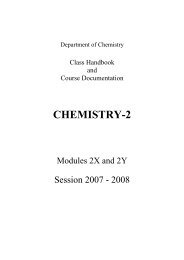

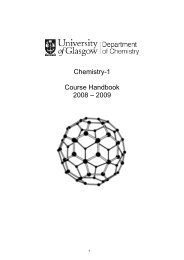
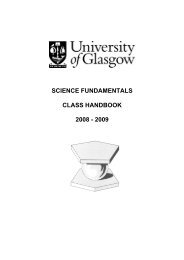
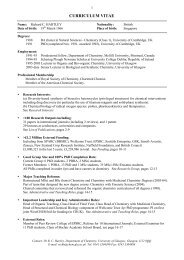
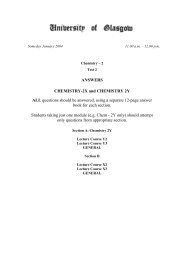
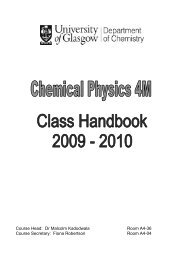
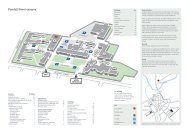
![Environmental Chemistry Study [PDF] - University of Glasgow](https://img.yumpu.com/26854018/1/184x260/environmental-chemistry-study-pdf-university-of-glasgow.jpg?quality=85)

